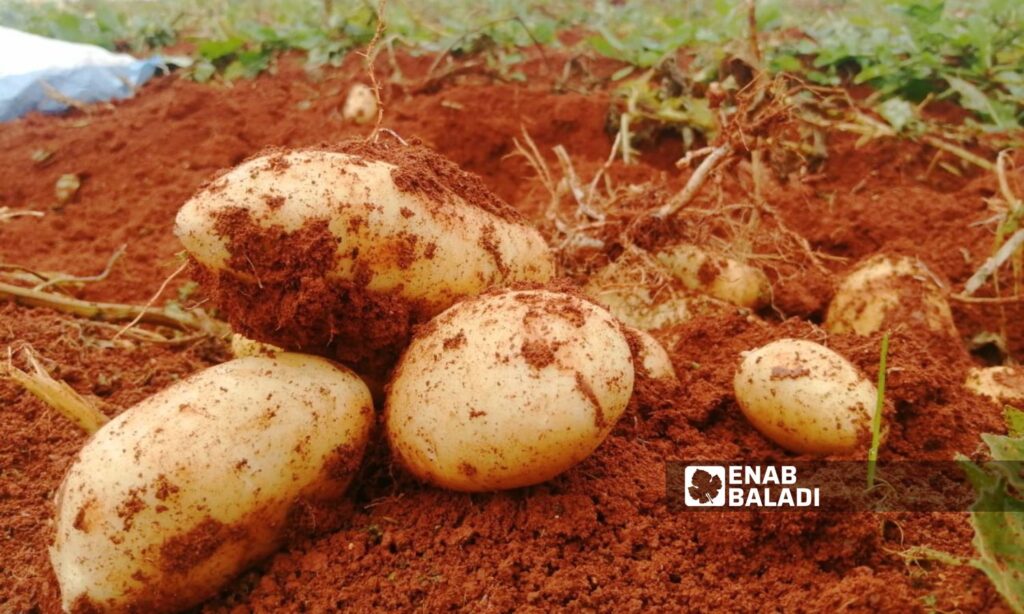The potato market in Idlib, northwest Syria, has suffered significant losses in previous seasons due to various factors, such as diseases and the spread of a particular variety in a limited market with the entry of imported potatoes.
The introduction of new varieties and their successful cultivation, along with stabilizing potato prices in the al-Hal market in US dollars and regulating their export, has contributed to a slight improvement in their prices, thereby sparing farmers from larger financial losses, according to farmers interviewed by Enab Baladi.
Potato cultivation is widespread across vast lands in Idlib, as the soil fertility and moderate climate are suitable for it. It is planted twice a year and ranks second in importance after wheat in Idlib governorate.
2300 Hectares
The cultivated area for potatoes in Idlib this year is estimated to be around 2300 hectares, encompassing several varieties such as Arizona, Montreal, Agria, Algeria, Sennarji, and Spunta, as stated by the Director of Agriculture in Idlib, Engineer Tamam al-Hamoud.
Al-Hamoud also pointed out that potatoes are a staple food in the Syrian diet, emphasizing their role in food security. Additionally, they contribute to the economic activity in the region and the employment of labor.
Twice a year
Potatoes are planted from mid-January to mid-February, as a spring growing with harvesting beginning in early July. The cultivation of different varieties during this period is considered successful, according to Anas al-Ismail, a farmer in the city of Sarmin, east of Idlib.
Al-Ismail explained that potatoes are also planted during autumn, with planting starting from mid-July to mid-August and harvesting from early November to the end of February. Suitable varieties for this period include Arizona, Agria, and Montreal.
The productivity of the potato crop was moderate this year due to its susceptibility to heatwaves, fungal diseases, and the broad mite disease.
The quantities produced per hectare range between 40 and 60 tons for most varieties, while the average production of industrial varieties is 35 to 40 tons. Seed quality and weather conditions also play a role in potato production, according to farmers.
Al-Ismail mentioned that the yield from his four-hectare land was low, ranging from 20 to 25 tons per hectare. He found the prices satisfactory for the industrial variety, reaching around $300 per ton.
On the other hand, Hassan Hilal, a farmer from the eastern countryside of Idlib, stated that the potato season was negatively affected this year by high summer temperatures, causing losses for farmers. He considered the purchase price to be low compared to the expenses.
Hilal, a displaced farmer from the village of Talhiyah, east of Idlib, rented a 20-dunum land near the city of Taftanaz and planted potatoes. The yield was 1.2 tons per dunum, and he sold one ton for $225.
He explained that the costs were high, reaching around $4,000 per hectare, including irrigation, labor, transportation, and al-Hal market commission. From one hectare, he sold 12 tons for $2,700.
Pricing in US dollars
Ata al-Ali, a potato farmer and merchant, told Enab Baladi that the availability of multiple varieties in the market has contributed to the improvement of potato prices this season.
He explained that the best varieties are Agria and Montreal, which are known in the market as the industrial type, as they are in demand by potato chip factories and restaurants. The price per ton increased by about $70 compared to other varieties.
Potato prices are valued in dollars in the al-Hal wholesale markets, ranging between $275 and $300 per ton for the industrial variety, while prices for other varieties range from $200 to $225 per ton.
The US dollar exchange rate is 28.9 Turkish lira for selling and 29.3 for buying, according to the Union of Money Changers in Idlib.
According to the Idlib Agriculture Directorate, the surplus potato crop is allowed to be exported annually, with approximately 20,000 tons exported this year. During months of low supply, it is permissible to import around five thousand tons of potatoes.
The directorate regularly conducts inspections of the potato seeds imported through designated border crossings for agriculture to ensure their quality and freedom from diseases and fungi, as well as monitoring fertilizers and agricultural drugs.

